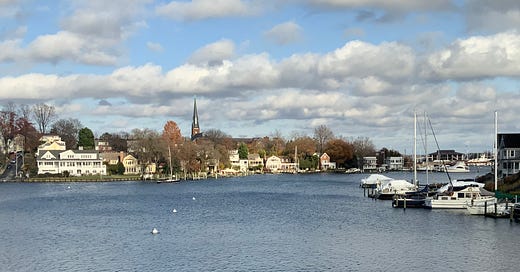It was a rainy, gloomy morning along Spa Creek but this sailboat across the Creek is trying to get out of here as the sun makes a guest appearance. I suspect many people were glued to their televisions during the gloom around here, watching the U.S. Men’s Soccer team play their rivals from the Netherlands in an elimination game at the World Cup in Qatar.
Sadly, the U.S. team lost 3-1 but those of us with long memories are celebrating regardless of this final score. Huh? I consider it a win that so many people were even aware of this mega-tournament when you consider the NCAA and NFL football seasons are wearing down while the NBA and NHL, along with NCAA basketball, are warming up.
I remember a pro player visiting my school in the 1960s to advocate we play soccer rather than just softball, baseball, or football. Most kids at the event were completely bored but happy we got out of class. I thought he made sense because I had spent a while in South America where futbol (rather than football) was the game of choice for my peers. The speaker departed, then I don’t recall any further discussion of the sport through that entire grade.
Similarly, during the 1974 Mundial, the world’s attention was entirely glued to the matches as if they were the lunar landing or a harbinger of war (There had been the 1969 ‘soccer war’ between El Salvador and Honduras, after all). Each and every event was such a show stopping moment in a soccer-obsessed world but here in the United States not so big a thing.
This was all before twenty-four hour television or specialised sports cable, of course. No one had a personal laptop or streaming device for several more years. But the truth was that we did not care because it was not us.
Soccer was only beginning to be the mega-competition for kids in suburbs across the country. ‘Soccer moms’ were not a known group, certainly not a class of folks to whom we empowered wisdom or voting. Little boys tended to play football or baseball, while girls did other things like softball or gymnastics. Soccer took off simultaneous with both seeing European futbol matches on cable television and nascent concerns about the impact of American football violence in some school districts.
The United States did make an advance in world soccer in the 1990s. Men requalified for play in the tourney in 1990 after a forty year period of frustrating hiatus, followed by the Cup events occurring here four years later bringing many new fans to the sport. The country then celebrated a women’s team victory the FIFA World Cup in 1999 with elan.
As the 2022 Cup approached, discussions about soccer and national pride rose. As perennial powers Germany and Belgium failed to advance, and even traditional winners Argentina and Brazil confronted early problems, excitement within the United States began to crescendo with hope this would be the year for victory! The head-to-head competition with Iran several days ago seemed to signify something geopolitical rather than merely a game. The U.S. win that afternoon only reinforced hopes.
Alas, today’s final score sealed the fate for the 2022 team failing to advance.
The attention this year, however, indicates that for all the anger and anxiety globalisation hath wrought, it also has brought some soft connections that may endure. People look for World Cup matches and build them more consistently into their annual event planning. Fans recognise with far greater nuance the skills player from around the world bring to these matches, and they applaud them appropriately. Soccer may never be the national past time it is for the majority of folks elsewhere but it has indeed become a fixture in our minds. This is good because it proves we do not entirely shut off the rest of the world as we sometimes appear.
I had friends visiting for about ten days from Scotland in 1993. After perhaps four days, one announced frustratedly that our newspapers and television broadcasts had no news from home, meaning the United Kingdom. She explained that she had been reading from cover to cover and could not understand why we did not care about what was going on across the pond. Instead, we had short stories about Idaho and perhaps slightly longer pieces on LA. She asked why we were so obsessed with ourselves?
I chose not to point out her question was one indicating she was focused on her own country in the same way. I did, however, note that most people in the United States know virtually nothing about others across our own country beyond the most superficial. Someone in Maryland most likely does not know that Boise is the capital of Idaho, much less where Idaho is or where Olympia is further west in Washington. There are lots and lots of us. We have a hard enough time absorbing what goes on in our own communities, much less distant states or—imagine!—foreign countries. This is more true today, even with the technology available to us to make instantaneous communication so easy.
I do see it as a win that we seem to embrace soccer. We can become interested in something beyond our doorsteps! Time, as usual, is the key along with familiarity making the heart grow fonder. Oh, and the World Cup? Developing the winning team for 2026 begins today. FIN




